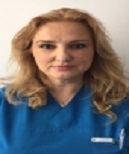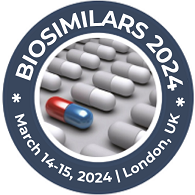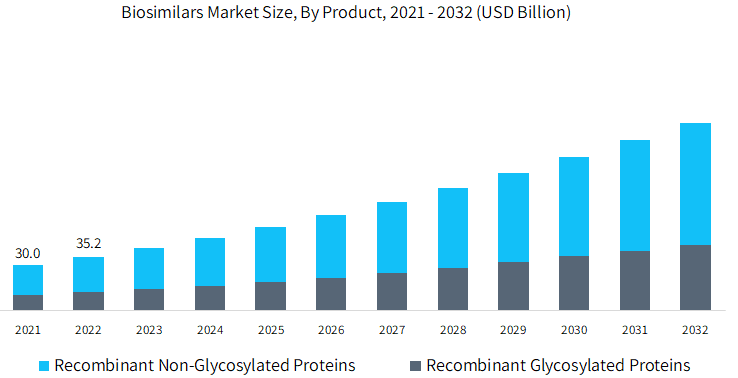Scientific Sessions
TRACK -1: Biosimilar and Biologics
Biosimilars are biological products that are highly similar to an already approved biologic reference product, known as the originator or reference biologic. Biosimilars are developed to be comparable in terms of safety, efficacy, and quality to the reference product. To gain approval, biosimilars undergo a comprehensive comparability exercise, which includes extensive analytical studies and clinical trials, to demonstrate that they are highly similar to the reference biologic.
Biologics are a class of medicinal products derived from living organisms or their components. They are produced using advanced biotechnology techniques and are typically large and complex molecules, such as proteins, antibodies, or nucleic acids. Biologics are used to treat various diseases, including autoimmune disorders, cancer and chronic diseases like diabetes. Unlike traditional small molecule drugs. which are chemically synthesized biologics are manufactured using living cells or organisms, such as bacteria or yeast.
Biosimilars Conferences | Pharmaceutical and Biopharmaceutical Research | Biologics and Biomarkers Conferences | London Conferences | Pharmaceutical Conferences
TRACK -2: Biopharmaceuticals
Biopharmaceuticals also known as biologic drugs or biologics, are pharmaceutical products derived from biological sources, such as living cells or organisms. They are produced using biotechnology techniques and typically consist of large, complex molecules, such as proteins, peptides, antibodies, nucleic acids, or living microorganisms.
Biopharmaceuticals have revolutionized the field of medicine by offering innovative treatment options for various diseases, including cancer, autoimmune disorders, hormonal imbalances, genetic diseases, and more. They are designed to target specific molecules or pathways involved in disease processes, providing highly targeted and personalized therapies.
Biosimilars Conferences | Pharmaceutical and Biopharmaceutical Research | Biologics and Biomarkers Conferences | London Conferences | Pharmaceutical Conferences
TRACK -3: Bio Equivalence Assessment
Bioequivalence assessment is a crucial step in the evaluation of generic drugs or biosimilar products. It compares the pharmacokinetic and sometimes pharmacodynamic properties of a generic/biosimilar drug to that of a reference drug (innovator drug) to determine if they are equivalent in terms of safety and efficacy.
The purpose of bioequivalence assessment is to demonstrate that the generic or biosimilar product is highly similar to the reference product, showing comparable bioavailability and similar therapeutic effects. It is based on the principle that if two products are bioequivalent, they can be expected to have the same therapeutic outcome when administered to patients at the same dosage
Biosimilars Conferences | Pharmaceutical and Biopharmaceutical Research | Biologics and Biomarkers Conferences | London Conferences | Pharmaceutical Conferences
TRACK -4: Biosimilars
Biosimilars are biological products that are highly similar to an already approved reference biologic, known as the originator or reference product. Biosimilars are developed to have a comparable quality, safety, and efficacy profile to the reference product.
Here are some key points about biosimilars:-
Regulatory Approval: Biosimilars undergo a rigorous regulatory approval process to demonstrate their similarity to the reference product. The specific requirements for approval may vary across countries, but they generally involve extensive analytical and clinical studies to establish biosimilarity.
Similarity not Identical: Biosimilars are not identical copies of the reference product but are highly similar in terms of quality attributes, biological activity, and clinical performance. Minor differences may exist due to the inherent complexity of biologics and the manufacturing process, but these differences are not clinically meaningful.
Comparative Studies: To establish biosimilarity, comparative studies are conducted to evaluate the biosimilar and reference product side by side. These studies include analytical characterization, nonclinical studies, and clinical trials (including pharmacokinetic and pharmacodynamic assessments) in relevant patient populations.
Interchangeability: Some biosimilars may also seek an additional designation of "interchangeability." Interchangeable biosimilars can be substituted for the reference product without the intervention of the healthcare provider. Interchangeability status is subject to additional regulatory requirements and may not be applicable in all regions.
Cost-Effectiveness: Biosimilars offer the potential for increased access to biologic therapies and can contribute to cost savings in healthcare systems. By providing more affordable alternatives to reference products, biosimilars can enhance competition, improve patient access, and help reduce healthcare expenditures.
Therapeutic Applications: Biosimilars cover a wide range of therapeutic areas, including autoimmune diseases, oncology, diabetes, and more. They provide treatment options for patients who may have limited access to expensive biologic therapies.
Safety and Monitoring: Biosimilars undergo rigorous post-marketing surveillance to ensure ongoing safety monitoring. Robust pharmacovigilance systems are in place to track any potential adverse events or unexpected effects associated with the use of biosimilars.
It's important to note that healthcare providers play a critical role in the appropriate use of biosimilars. They need to be informed about the availability, regulatory approvals, and clinical evidence surrounding biosimilars to make informed decisions in the best interest of their patients.
Overall, biosimilars contribute to increasing patient access to biologic therapies, offering more affordable options while maintaining comparable safety and efficacy to the reference product. They provide an important avenue for expanding treatment options and promoting sustainable healthcare systems.
Biosimilars Conferences | Pharmaceutical and Biopharmaceutical Research | Biologics and Biomarkers Conferences | London Conferences | Pharmaceutical Conferences
TRACK -5: Biologics
Biologics also known as biopharmaceuticals or biological drugs, are pharmaceutical products derived from living organisms or their components. They are produced using biotechnology techniques and can include proteins, peptides, antibodies, vaccines, gene therapies, and cellular therapies.
Here are some key points about biologics:
Source and Complexity: Biologics are derived from biological sources, such as microorganisms, animal cells, or human cells. They are often large and complex molecules, with unique three-dimensional structures and intricate manufacturing processes.
Targeted Therapies: Biologics are designed to target specific molecules, receptors, or pathways involved in disease processes. They can modulate immune responses, block signaling pathways, replace deficient proteins, or deliver therapeutic agents directly to diseased cells.
Biosimilars Conferences | Pharmaceutical and Biopharmaceutical Research | Biologics and Biomarkers Conferences | London Conferences | Pharmaceutical Conferences
TRACK -6: Biomarkers
Biomarkers are measurable indicators or characteristics that can be objectively evaluated and used as a biological sign or measurement of normal biological processes, pathogenic processes or responses to therapeutic interventions. They can be found in various biological sources, such as blood, urine, tissues, or imaging scans.
Here are some key points about biomarkers:
Diagnostic Biomarkers: Biomarkers can be used to diagnose diseases or conditions. They provide objective evidence of the presence or absence of a disease or indicate the likelihood of developing a disease. For example, certain proteins or genetic markers can be used as diagnostic biomarkers for cancer.
Prognostic Biomarkers: Prognostic biomarkers provide information about the likely outcome or progression of a disease. They help determine the course of the disease, predict the likelihood of recurrence, or assess the response to treatment. Prognostic biomarkers are valuable for making treatment decisions and determining patient outcomes
Biosimilars Conferences | Pharmaceutical and Biopharmaceutical Research | Biologics and Biomarkers Conferences | London Conferences | Pharmaceutical Conferences
TRACK 7: Emerging Biosimilars in Therpeutics
Emerging Biosimilars in Therpeutics There are several emerging biosimilars in the field of therapeutics. While the landscape is constantly evolving, here are a few notable examples of biosimilars that have gained attention:
Adalimumab Biosimilars: Adalimumab is a widely used monoclonal antibody that targets tumor necrosis factor-alpha (TNF-α) and is used to treat autoimmune conditions such as rheumatoid arthritis, psoriasis, and inflammatory bowel disease. Several biosimilar versions of adalimumab have been developed and approved in various regions.
Trastuzumab Biosimilars: Trastuzumab is a monoclonal antibody used in the treatment of HER2-positive breast cancer and gastric cancer. Biosimilars of trastuzumab have been developed and approved as cost-effective alternatives, expanding patient access to this important therapy.
Rituximab Biosimilars: Rituximab is a monoclonal antibody used to treat certain cancers, such as non-Hodgkin lymphoma, as well as autoimmune conditions like rheumatoid arthritis. Biosimilars of rituximab have been developed and approved, providing more affordable options for patients.
Biosimilars Conferences | Pharmaceutical and Biopharmaceutical Research | Biologics and Biomarkers Conferences | London Conferences | Pharmaceutical Conferences
TRACK -8: Clinical Development of Bio Similars
The clinical development of biosimilars involves a series of rigorous steps and studies to establish their similarity to the reference biologic and demonstrate their safety and efficacy. While the specific requirements and guidelines may vary across regulatory authorities and regions, here is a general overview of the clinical development process for biosimilars.
Analytical Comparability: Before initiating clinical trials, extensive analytical studies are conducted to compare the biosimilar and the reference biologic. These studies evaluate the physicochemical properties, biological activity, and structural characteristics of both products to ensure they are highly similar.
Nonclinical Studies: Nonclinical studies, including in vitro and in vivo preclinical studies, are conducted to further assess the similarity and potential toxicological effects of the biosimilar compared to the reference product. These studies help identify any potential differences and inform the design of clinical trials
Biosimilars Conferences | Pharmaceutical and Biopharmaceutical Research | Biologics and Biomarkers Conferences | London Conferences | Pharmaceutical Conferences
TRACK-9: Pharmacovigilance Challenges in Biosimilars
Pharmacovigilance the science and activities related to the detection, assessment, understanding and prevention of adverse effects or any other drug-related problems, presents unique challenges in the context of biosimilars. Here are some of the key challenges in pharmacovigilance for biosimilars:
Immunogenicity: Biosimilars like their reference biologics, have the potential to induce an immune response in patients. However, the immunogenicity of biosimilars may differ from that of the reference product due to minor differences in structure, impurities, or manufacturing processes. Assessing and managing immunogenicity is a critical challenge in pharmacovigilance, as it can lead to adverse events and impact patient safety and treatment efficacy.
Traceability and Product Identification: Ensuring accurate traceability and identification of specific biosimilar products can be challenging. Unlike small molecule generics, which have unique generic names and are easily traceable, biosimilars often share the same international nonproprietary name (INN) as the reference product. This can complicate the collection of accurate and specific adverse event data for individual biosimilars.
Biosimilars Conferences | Pharmaceutical and Biopharmaceutical Research | Biologics and Biomarkers Conferences | London Conferences | Pharmaceutical Conferences
TRACK-10: Globilization of Bio Similars
The globalization of biosimilars refers to the expansion of the development, production, regulation, and market access of biosimilar products across different regions and countries. Here are some key aspects of the globalization of biosimilars.
Regulatory Harmonization: Regulatory authorities around the world have been working to harmonize guidelines and requirements for the approval of biosimilars. This harmonization aims to establish consistent standards for demonstrating similarity, efficacy, and safety across different regions. Organizations such as the International Council for Harmonisation of Technical Requirements for Pharmaceuticals for Human Use (ICH) and the World Health Organization (WHO) play a role in promoting global harmonization efforts
Biosimilars Conferences | Pharmaceutical and Biopharmaceutical Research | Biologics and Biomarkers Conferences | London Conferences | Pharmaceutical Conferences
TRACK-11:-Surgeons and Physicians
Physicians also known as doctors or medical doctors (MDs) are healthcare professionals who diagnose, treat, and manage a wide range of medical conditions. They specialize in the field of medicine and provide non-surgical medical care to patients. Physicians may choose to specialize in specific areas such as internal medicine, pediatrics, cardiology or dermatology. They work in various settings, including hospitals, clinics, private practices, and research institutions.
The responsibilities of physicians include:
-
Conducting medical examinations and taking detailed patient histories to diagnose medical conditions.
-
Ordering and interpreting diagnostic tests, such as blood tests, imaging studies, or biopsies.
-
Developing and implementing treatment plans, which may include medications, therapies, lifestyle changes, or referrals to specialists.
-
Monitoring and managing chronic conditions, providing preventive care, and promoting overall health and well-being
Biosimilars Conferences | Pharmaceutical and Biopharmaceutical Research | Biologics and Biomarkers Conferences | London Conferences | Pharmaceutical Conferences
TRACK-12:- General Surgery
General surgery is a surgical specialty that focuses on the surgical treatment of a wide range of medical conditions. General surgeons are highly trained medical professionals who have expertise in performing surgical procedures on various parts of the body. They are skilled in both elective and emergency surgeries and play a crucial role in providing comprehensive patient care.
Here are some key aspects of general surgery:
-
Scope: General surgery encompasses a broad range of surgical procedures involving different organs and body systems. General surgeons may perform surgeries related to the gastrointestinal tract (including the esophagus, stomach, intestines, liver, and pancreas), endocrine system (thyroid and parathyroid glands), breast, skin and soft tissues, vascular system, and more. They also handle surgical emergencies, such as appendicitis, trauma, or perforated organs.
-
Surgical Procedures: General surgeons perform a variety of surgical procedures, including but not limited to:
-
Abdominal surgeries: Such as appendectomy, cholecystectomy (gallbladder removal), hernia repairs, colectomy (removal of part or all of the colon), and gastric bypass.
-
Breast surgeries: Including lumpectomy and mastectomy for breast cancer or other breast conditions.
-
Endocrine surgeries: Such as thyroidectomy (removal of the thyroid gland) or parathyroidectomy (removal of parathyroid glands).
-
Skin and soft tissue surgeries: Including removal of skin lesions, hernia repairs, or treatment of abscesses.
-
Vascular surgeries: Such as the placement of vascular access for dialysis or the treatment of varicose veins
Biosimilars Conferences | Pharmaceutical and Biopharmaceutical Research | Biologics and Biomarkers Conferences | London Conferences | Pharmaceutical Conferences
TRACK-13:- Oral and Maxillofacial medical procedure
Oral and Maxillofacial Surgery (OMS) is a surgical specialty that focuses on the diagnosis and treatment of conditions related to the mouth, jaws, face, and associated structures. It is a combination of dentistry, medicine, and surgery. Oral and Maxillofacial surgeons are highly trained professionals who specialize in performing surgical procedures in this field. Here are some key aspects of Oral and Maxillofacial Surgery
-
Scope: Oral and Maxillofacial surgeons are involved in the diagnosis and treatment of a wide range of conditions, including:
-
Dental extractions, including impacted wisdom teeth.
-
Dental implant placement and bone grafting procedures.
-
Corrective jaw surgery (orthognathic surgery) to correct jaw deformities or misalignments.
-
Treatment of facial trauma, such as fractures of the jaw, cheekbones, or nose.
-
Removal of benign or malignant tumors in the oral and facial region.
-
Treatment of temporomandibular joint (TMJ) disorders and facial pain.
-
Management of congenital facial deformities, such as cleft lip and palate.
-
Facial cosmetic surgeries, such as facial rejuvenation procedures or chin augmentation.
Biosimilars Conferences | Pharmaceutical and Biopharmaceutical Research | Biologics and Biomarkers Conferences | London Conferences | Pharmaceutical Conferences
Past Conference Report
BIOSIMILARS 2023
16th International Conference on Biosimilars and Pharmaceuticals was held during June 23-24, 2023 at Paris, France. With the support and contribution of the Organizing Committee Members, we successfully hosted the event at the conference venue. Firstly we must thank you for trusting us and participating at Biosimilars 2023 a global platform to discuss various important details Pharmaceuticals and Health Care.
There are many reasons to extend our gratitude to you for making the Biosimilars 2023 outstanding conference. We couldn't have done it without your continuous support and believe towards our organization, which mutually made to achieve a new heights in the field of Health Care and Pharmaceuticals. The conference was marked with the attendance of Pharmacists, Health Care Professionals and talented student communities representing more than 30 countries who have driven this event into the path of success. The conference was organized around the theme “Future Prospects and Advancements of Biosimilars and Pharmaceuticals”. The event implanted a firm relation of upcoming strategies in the business related field with the scientific community.
The conference proceedings were carried out through various Scientific-sessions and plenary lectures of which the following Speakers were highlighted as: The conference witnessed an amalgamation of peerless speakers, Keynote speakers, well-known International speakers and delegates who enlightened the crowd with their enviable research knowledge and on various alluring topics related to the field of Pharmaceuticals and Health Care, through their fabulous presentations at the podium of Biosimilars Summit. We offer its heartfelt appreciation to all the Organizing Committee Members, Chairs and Co-chairs, Speakers, Students and Editorial Board Members who supported the conference in every aspect for the awe-inspiring exhibition at the venue. We are also obliged to various delegate experts, company representatives and other eminent personalities who supported the conference by facilitating active discussion forums. We sincerely thank the Organizing Committee Members.
So, as continuation of Biosimilars 2024 we would like to heartily invite you to 17th International Conference on Biosimilars and Pharmaceuticals in the dated of March 14-15, 2024 at London, UK. We look forward to see your presence with active contribution and support to make this event successful once more.
Contact for more details:
Program Manager | Biosimilars 2023
Past Reports Gallery










